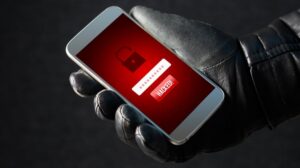
How to Protect Your Phone from Hackers in 8 Sensible Steps
Introduction: How to Protect Your Phone from Hackers
In this article, I’ll discuss my thoughts and suggestions for how to protect your phone from hackers.
Let’s be honest: having your phone hacked can be terrifying. Phone hacking is not only embarrassing; it is also a serious issue with potentially devastating consequences. It can lead to the loss of personal information, financial losses, identity theft, and other forms of fraud. You may feel violated, exposed, and vulnerable as a result.
Phone hacking is, unfortunately, getting increasingly common. Hackers access your phone using various methods, including malware, phishing tactics, and social engineering. If they have access, they may steal your data, follow your activities, and even take control of your device.
Malware is malicious software that hackers can install on your device without your knowledge. Sending emails or text messages that look to be from a genuine source but are really from a hacker is one way of phishing. Social engineering is a technique used to dupe people into providing sensitive information.
According to an article published by https://www.zippia.com/:
“Phishing attacks on mobile devices are increasingly more common.”, accounting for 60% of all cyber fraud. The increased global reliance on cell phones, mobile banking, and mobile devices for sensitive business activities has contributed to an increase in mobile cyber fraud “.
A hacker with access to your phone may do a variety of things. They can steal personal information such as contacts, photos, and financial information. They can also listen to your phone calls, texts, and emails. In some cases, they can even take control of your device and use it to send messages or make phone calls.
Reasons to Protect Your Phone from Hackers
The fact is that hackers are increasingly targeting cell phones as smartphones get more advanced. And more advanced phones are becoming indeed.
Your phone is a piece of personal technology that contains important private data about you. That being said, here are eight reasons why you should take the required steps to protect your phone from hackers:
1. Safeguard Your Identity: Your phone has a plethora of personal information that hackers may use to steal your identity. Hackers can use this information to create new accounts in your name or get access to existing ones.
Consider this: an identity theft case is reported every 22 seconds. According to analysts, these incidents occur so often that a new victim is discovered every 22 seconds. Most studies predict this ratio will climb in 2023, making it an even more significant issue for Americans.
2. Prevent Financial Loss: If a hacker gains access to your bank or credit card accounts, they may empty them and do you significant financial harm.
Consider this: According to the FTC, credit card fraud is the most common sort of identity theft detected in the United States in the first half of 2022, accounting for 230,937 claims out of a total of 603,591 identity fraud events reported nationwide for the six months.
3. Safeguard Your Privacy: Hackers can use the information on your phone to spy on you or get access to your online accounts. Hackers can compromise your privacy and expose you to potentially damaging attacks.
4. Safeguard Your Information: Hackers can gain access to your phone’s data and use it to further their goals. Access involves stealing private information, getting passwords, and accessing private communications.
5. Prevent Malware: Malware can be installed on your phone without your knowledge, allowing thieves to access your device and data.
6. Secure Your Images: Hackers can acquire access to your images and videos, which can be embarrassing and even damaging if made public.
7. Prevent Phishing: Hackers can send malicious links and emails to your phone to obtain access to your personal information.
How many phishing incidents were there in 2022?
SlashNext investigated billions of link-based URLs, attachments, and natural language interactions across email, mobile, and browser channels over six months in 2022 and detected more than 255 million assaults – a 61 percent increase in the frequency of phishing attempts compared to 2021.
8. Prevent Spam: Since around 15 billion spam emails are sent over the internet daily, spam filters are “working overtime” and may allow dangerous phishing attacks to slip through. In 2021, 83% of businesses reported phishing attacks.
Hackers may also attempt to get personal information from you by sending spam texts to your phone.
You may take numerous actions to solve the critical question of how to protect your phone from hackers, which we will cover in the next section.
How to Protect Your Phone from Hackers by Following 8 Sensible Steps

We’ve all heard horror stories about hackers obtaining personal information, but our phones are among the most vulnerable pieces of technology. With the correct information and tools, anyone with minimal technological ability may get access to and misuse our devices. So, how can you keep hackers from accessing your phone?
Following are eight practical measures for answering how to protect your phone from hackers.
1. Obtain Commercial Antivirus Software
The additional security and peace of mind provided by upgrading from free antivirus software to a total internet security solution is well worth the investment.
Using professional-grade antivirus software is the most crucial step you can take to protect your phone from hackers.
Antivirus software detects, stops, and eliminates potentially harmful infections from your computer. It can identify and protect your device against viruses, trojans, worms, spyware, and other forms of malware.
Typically, antivirus software analyzes your device for malicious files or programs. They will be quarantined or removed if detected. It can aid in the prevention of malicious websites and programs from being downloaded into your smartphone.
Most commercial-grade antivirus software has additional features such as real-time protection, which monitors your device for potentially harmful behaviors, and anti-phishing protection, which guards against attempts to steal your personal information. In addition, several antivirus programs can analyze incoming emails and downloads to safeguard your device better.
2. Make use of a Paid VPN Service.
People are still debating whether to utilize free or paid VPN services in 2023. To put it simply, nothing in our lives is free. Everything has a cost. Paying for a premium VPN service is worth it. The downsides of using a free VPN service provider are numerous; nevertheless, we will not discuss them here.
Using a Virtual Private Network is another critical step in securing your phone from hackers. A VPN protects you from potential cyber threats by encrypting your data and masking your IP address.
A VPN shields your data from potential hackers by blocking them from accessing important information. A VPN secures your internet activities by creating a tunnel, enabling you to surf the web without being observed or tracked. It also conceals your IP address and encrypts your data, making it impossible for hackers to steal your information.
3. Keep Software Updates Current
In today’s digital environment, software upgrades are crucial for security. These are meant to resolve any security issues that may have occurred in prior versions of the application.
You should also ensure that any security software on your phone is up to date. Antivirus software, firewalls, and everything else you employ to protect your data are examples of tools. Updating this software guarantees that it can detect any new threats.
4. Always install and download apps from reputable sources.

Another crucial suggestion for ‘how to safeguard your phone from hackers’ is to only download and install apps from reliable sites. While exploring the app store, it is vital to know the risks of downloading and installing apps from unknown sources.
Harmful software, sometimes known as malware, may be used to steal personal data, track your movements, and even take control of your device. It is vital to only download software from reputable websites renowned for their security features. To begin with, downloading apps from shady websites may expose you to malicious viruses.
Another risk of downloading and installing software from dubious websites is that you could wind up with an outdated version. Older program versions may include security flaws that hackers can exploit. Just download the most recent version of the software to keep your smartphone secure.
Choose a complex password to protect your devices from unauthorized access.
A complex password is significantly more secure than a simple four-digit password. It consists of at least eight characters made up of letters, numbers, and symbols. It should also not include any personally identifying data, such as your name, birth date, or address.
Configure unique passwords for different programs to provide additional security. The most efficient method is to use a password manager.
Password managers save and encrypt all of your passwords in a database, allowing you to access all of your passwords from a single secure location, eliminating the need to recall multiple passwords.
But here is the downside – password managers save your credentials “in the cloud” and are routinely hacked – it’s a never-ending loop. Never, ever save any essential or sensitive passwords on the cloud. Doing so is about as risky as anything you could do on purpose or by chance.
I’ve included a self-contained password manager local to your PC. It requires no opt-in or registration and is completely free. Nothing about it links to the internet in any way. It protects the essential credentials on your local computer.
Here’s a link to our training center’s instructional video (no login necessary); you can check it out to see whether it’s anything you need (I assure you, you do). If you wish to download it, check on the left side of that tutorial page and select the “Description” link, which will take you to the direct download URL.
It’s here: RememberWhen (Password Manager)
6. Set up Two-Factor Authentication (2FA)
What precisely is 2FA and how can I enable it?
Two-factor authentication (2FA), often known as two-step verification or dual-factor authentication, is a security technique in which users must provide two different authentication factors to be validated.
2FA protects a user’s credentials and the resources to which the user has access.
You can select the most convenient authentication method for you. You have several authentication choices, such as SMS or app-based authentication.
SMS authentication requires you to input a code sent to your phone via text message. App-based authentication necessitates using a phone app to generate a code entered into the system. Whichever method you use, please ensure that it is secure and that you have a backup plan in case you lose access to your phone.
7. Avoid clicking on unknown links or files.
We’ve all heard it a million times, but it’s worth repeating: Never click on unknown links or files! Clicking on unfamiliar links or files on your phone, computer, or tablet might harm your device and data.

Clicking on unknown URLs or files may expose your device to malicious software, viruses, and ransomware. Hackers can use malicious software to get access to your devices and personal data, such as passwords and credit card information.
Second, clicking on unknown links or files might be dangerous since they can lead to phishing or other dangerous websites. Phishing websites are designed to seem legitimate but are actually malicious sites designed to steal your personal information.
How to Protect Your Phone from Hackers: It is vital to avoid visiting unfamiliar websites or downloading unknown files. Double-check the sender’s email address and the link or file to guarantee its safety whenever you receive a link or file from an unknown source.
8. Learn How to Lock or Wipe Your Phone Remotely
Remote wiping is a safety feature that allows network administrator or device owner to send a command to a computer device that deletes data. It is commonly used to delete data from a lost or stolen device so that the data is not compromised if it falls into the hands of the wrong people.
Most smartphones and tablets now include this feature, which allows you to remotely lock or wipe your device if it is stolen or misplaced. Examine your device’s settings to see whether this is an option.
This is the Service we Use for Our Online Security
Data is the new currency, and you can’t afford to gamble on its safety. We don’t; thus, we rely on Sophos Home Premium to handle all our online security requirements.
Sophos Limited developed Sophos Home Premium, a British company focused on digital security, and is our go-to for ‘how to stay secure in any online activity.’
Here’s the deal: Sophos Home is more than just an antivirus program. It safeguards against the most recent and unusual online risks, such as malware, adware, keyloggers, phishing attempts, and bogus websites.
It protects your online experience by stopping hackers from acquiring your credentials and gaining access to sensitive personal information via breaches and trickery. The robust web protection provided by Sophos Home ensures that you are not a victim of online fraud and that online dangers do not compromise your PC or Mac.
So, is my mobile device covered as a Sophos Premium customer?
Indeed, the answer is yes. Our free Intercept X for Mobile app can safeguard mobile devices.
Sophos Intercept X for Mobile safeguards Android and iOS devices, networks, and apps [both free] and can also protect Chrome OS devices.
How can I get Sophos Intercept X for Mobile to work on my device?
Sophos Home customers may use their mobile devices to visit the Sophos Home Dashboard and navigate to the appropriate shop (Apple or Google) by selecting the Add new device/Add device button.
Sophos Home members may also download the program directly from their devices’ Apple App Store or Google Play Store.
How to Protect Your Phone from Hackers: Do yourself a favor and follow this link to read more about why we rely on Sophos Home to protect our PCs, Macs, and mobile devices altogether.
The Post: How to Protect Your Phone from Hackers In 8 Sensible Steps was first seen on https://websecurityhome.com
This Post is Brought to You By:














Your insights on phone hacking really resonate with me, especially the emotional toll it can take on a person. Just last year, a close friend had their phone compromised through a phishing scheme disguised as a friendly message. It was such a wake-up call for all of us about how easily we can be manipulated!
It’s really unsettling how something as simple as a friendly message can become a tool for manipulation. I can imagine the impact it had on your friend; the emotional toll from that kind of violation can linger for a long time. I’ve experienced something similar when I stumbled upon a phishing attempt that initially looked just like a routine update from a service I use. It caught me off guard and made me realize just how sophisticated these schemes have become.
I totally get where you’re coming from; it’s alarming how easily we can fall victim to these scams. I recently came across some insights on wireless security that really broke down common threats and offered practical tips for staying safe online.
‘Wireless Security – From A to Z – Types, Threats, To How to Secure’
https://cable13.com/wireless-security-from-a-to-z-types-threats-to-how-to-secure/.
I completely understand where you’re coming from. It’s surprising how something we often take for granted, like a message from a friend or a familiar service, can turn into a gateway for manipulation. The emotional fallout from these moments can be profound. It’s not just about the financial aspect or the immediate danger; it’s that sudden sense of betrayal when trust is undermined.
It’s true, the emotional toll from feeling manipulated can linger in ways we might not even fully recognize. I’ve seen it affect not just individuals but entire communities when trust erodes. When you mentioned the phishing attempt that looked like a routine update, it really hit home for me. Those moments where you feel a shadow of doubt about something that should be benign—like a friendly message or a service update—can shake your confidence in online interactions and create an underlying anxiety about what might come next.
It really is eye-opening when something like that happens to someone so close to us. I remember a similar situation with a coworker who fell for a phishing email that looked like it came from our HR department. The fallout was extensive; not only was their personal information at risk, but it also led to some pretty invasive security measures for our entire team. It’s a harsh reminder of how fragile our digital lives can be.
Hearing about your friend’s experience really highlights how phishing schemes can appear so harmless at first glance, especially when they’re dressed up as friendly messages. It’s unsettling to think about how easily someone we trust can be used to compromise our security. It shows just how important it is to stay vigilant, as the tactics used by these hackers continue to evolve.
It’s true; the way these phishing schemes are designed makes them feel so innocuous. It reminds me of how we often let our guard down when we’re interacting with people we trust. I think it speaks to a larger issue in our society about communication and technology—how easily we can be manipulated through familiar channels.
You’re so right about how subtle phishing schemes can be. It really taps into the dynamics of trust we have in our online interactions. I’ve heard stories where someone received a message from a close friend that looked authentic, only to find out later that it was a hacked account pretending to be them. It really does make you question the authenticity of our communications, doesn’t it?
It really is sobering to think about how easily phishing schemes can slip into our daily lives, especially when they present themselves as something familiar or friendly. It reminds me of a conversation I had recently about the importance of digital literacy, not just for ourselves but for the people we care about. There’s a certain vulnerability that comes with trusting our connections, and when they’re manipulated, it can feel like a betrayal on multiple levels.
It’s really eye-opening when something like that hits close to home, isn’t it? Your friend’s experience is a stark reminder of how subtle these phishing schemes can be. It’s so easy to let our guard down when it comes from someone we know. This really emphasizes the importance of talking about these vulnerabilities more openly.